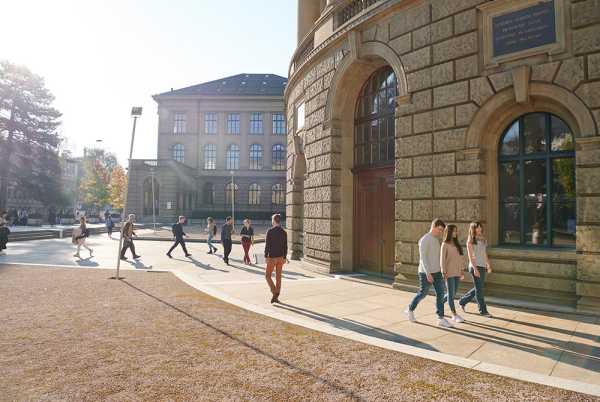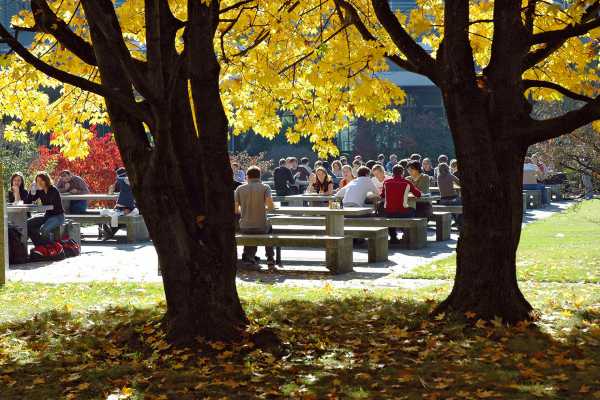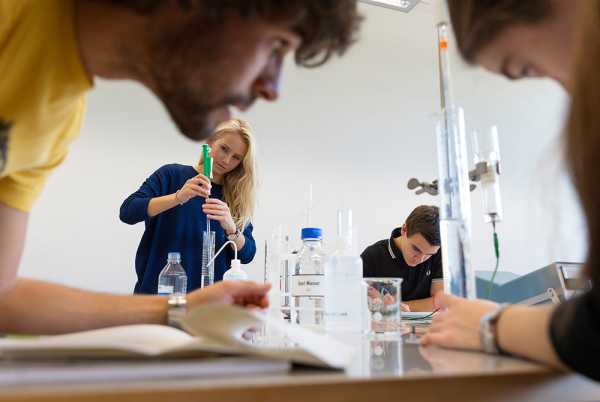Features and structure of ETH Zurich Bachelor's degree programmes
What is student life like at ETH Zurich? How much time does one invest in studies? When do examinations take place? When is there time for taking a holiday? Get an impression of daily academic life.
Childpage navigation







Features of ETH Zurich Bachelor's degree studies
Studies at ETH feature the following:
- Monodisciplinary studies
At ETH Zurich students have just one major, and no minors.
- Full-time studies
ETH Zurich studies are compact, with a clearly structured curriculum involving approx. 30 teaching hours per week plus independent study.
- The first year of studies concludes with the first-year examinations
The first-year examinations address what was covered in the first year of studies. The respective subjects are examined individually and grouped in one or more examination blocks. Each examination block must be passed separately.
- The main teaching language in all Bachelor’s degree programmes is German
However, knowledge of English is still essential. Depending on the degree programme, some lectures are already held in English in the first year. During your studies you will gradually get to know the jargon of your discipline and accustom yourself to English as a teaching language.
Language requirements during Bachelor’s degree studies
- Compulsory electives in general subjects (Science in Perspective subjects)
To earn a Bachelor’s degree you must acquire at least 6 credits in the category “Science in Perspective”. The aim of these courses is to enable students to link their disciplinary knowledge and behaviour with social and economic contexts. Some interdisciplinary degree programmes already integrate these general education subjects into their curricula and you may not select them yourself. Other degree programmes allow you to choose from the entire range.
- Choices in the second half of Bachelor’s studies and during Master’s studies
Most degree programmes offer you a range of different options to address your interests. This usually starts in the second half of Bachelor’s studies and particularly continues during Master’s studies.
- Possibilities for exchange stays in Switzerland and abroad
There are several possibilities for conducting semester exchanges and writing theses at other universities in Switzerland and abroad.
Learn more about the structure of ETH Zurich Bachelor’s degree studies.
FAQ: Everyday academic life
We have collected the questions most frequently asked by persons interested in studying. The answers are most valid for the first year of Bachelor’s degree studies. Note that in the end, each student shapes everyday academic life individually.
Studies at ETH Zurich are full-time. In specific, narrowly defined special study situations extra time can be given:
Studying as a parent
Studies and top-level sports
Studying with a disability
If you are in one of these categories, contact the responsible office as early on as possible.
Respite from your studies is important, and there should be room for leisure activities. You should note, though, that ETH studies are full-time and the workload is heavy. We recommend that you focus on your studies and at the same time consider what is really important to you next to them.
To get a picture of how your ETH week will look like, see “What will my timetable look like?”.
Studies at ETH Zurich correspond to a full-time job, with a heavy weekly workload of approx. 50 hours. However, this differs according to the degree programme and year of studies. We recommend concentrating fully on your studies during the first two semesters. After two or three semesters you can better estimate whether you have time for a part-time job.
If you are having trouble financing your studies, contact the ETH Zurich Financial Aid Office at an early stage.
Timetables differ greatly from degree programme to degree programme. You will find out what your first year of studies will look like at the prestudy event. Alternatively, you can put together your timetable with the help of the Course Catalogue. Some departments also publish their current course timetables online.
Depending on their location, lecture times also vary slightly.
The academic calendar shows when semesters begin and end. Depending on the degree programme there may also be obligatory components between semesters, such as laboratory practicals and excursions. The periods between semesters at ETH Zurich are termed “lecture-free” periods. Usually you will have 1-2 weeks’ holidays after the examinations, before the new semester begins.
Important: Many examinations take place near the end of the lecture-free period. This means that you will be preparing for examinations between semesters. For more information on examinations see “When do examinations take place?”
At ETH Zurich there are other types of examination in addition to end-of-semester and session examinations. All of these examinations are called “performance assessments”. For information on when performance assessments take place, see the respective page of the Examinations Office website.
Important: Many examinations take place near the end of the lecture-free period. This means that you will be preparing for examinations between semesters.
Studying at ETH involves both fixed and individual variable costs. The Financial Aid Office has compiled a list of costs (see the pdf living and study costs in the right context column).
If you will have trouble financing your studies, contact the Financial Aid Office for advice.
… not necessarily. Commuting to ETH for your studies is possible. Generally, one hour each way is manageable. However, if commuting becomes a burden on your time, you should consider moving. The Housing Office of the University of Zurich / ETH Zurich provides useful information and many links on their websites.
ETH Zurich expects that your knowledge of German is very good by the time studies begin. For this reason, there are only a small number of preparatory courses in German available. They are two-week intensive courses in German offered by the Language Center of the University of Zurich and ETH Zurich. They take place outside of the semester, i.e. in the summer before the academic year begins. After studies begin German courses can continue at the Language Center.
Find out about language course options directly from the external page Language Center of the University of Zurich and ETH Zurich.
ETH Zurich is a university which attracts students from all over Switzerland and around the world. Other students find themselves in the same situation. Below, there are some ideas how to meet people:
- Attend prestudy events to meet people before your studies begin.
- Join the study association of your degree programme (brings students together) and attend its events for first-semester students.
- Find out about other ETH Zurich associations and international student organisations. Maybe you might want to join them.
A semester abroad during Bachelor’s degree studies is usually possible in the third year of studies. Various universities may be selected depending on the degree programme. Exchange stays abroad are also possible during Master’s degree studies: for a semester, for a research project, and for the Master’s thesis. The Student Exchange Office will help you organise your exchange.